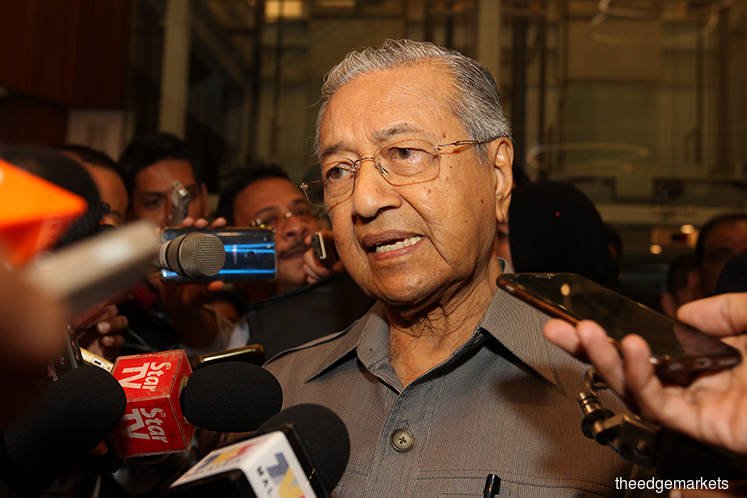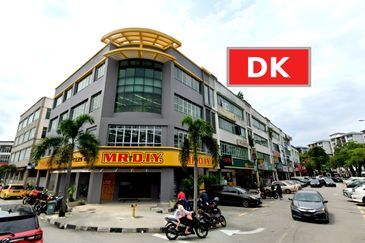
KUALA LUMPUR (Nov 22): In a world first, Malaysia will introduce the International Standards Organisation’s (ISO) anti-corruption certification system in all high-risk sectors of the government, Prime Minister Tun Dr Mahathir Mohamad announced yesterday.
The ISO 37001 certification for the Anti-Bribery Management System will be applied in all ministries, agencies, departments and government-linked companies (GLCs) that are at high risk in order to prevent corruption and develop a culture of integrity, he said.
“This effort will make Malaysia the first country in the world to apply the ISO 37001 certification in the public sector,” Dr Mahathir said.
The initiative was among seven policy measures that were discussed at a meeting of the Special Cabinet Committee on Anti-Corruption yesterday, which Dr Mahathir chaired yesterday.
The major drive against graft will begin in January with the launching of the National Anti-Corruption Plan, he said in a statement.
The plan features measures that are designed to strengthen the government’s administrative management system particularly on governance, integrity and anti-corruption, Dr Mahathir said.
The government will establish a public service ethics codes, including a requirement to sign a pledge of compliance by all civil servants and a review of regulations for the rotation of postings so that the public service will continue to be strengthened, he said.
A guideline on Corporate Liabilities and Adequate Procedures will be issued to all companies and from January 2020, Section 17A of the MACC Act, covering offences committed by commercial firms will be enforced, the statement said.
Bernama reported that a detailed study is being made on the proposed separation of functions of the public prosecutor and the attorney-general.
Dr Mahathir said the implementation of the proposal will have to be deferred because it involves amendments to the Federal Constitution.
“Right now we do not have the two-thirds majority in the Dewan Rakyat for the amendment to be approved,” he said.
In a report quoting Deputy Minister in the Prime Minister’s Department Hanipa Maidin, he said that the implementation of the proposal requires amending Article 145 of the Federal Constitution and a revision of the laws relating the powers of the public prosecutor and attorney-general provided under the Criminal Procedure Code and the Interpretation Acts 1948 and 1967.
On the political involvement of public servants, Dr Mahathir said that the policy will be fine-tuned to avoid conflicts of interest in the conduct of their official duties and to ensure that these functions are discharged in a fair and just manner.
He said that a detailed study would be conducted into this matter as the committee was currently still unable to determine the extent to which officers can be allowed to get involved in politics.
For example, Dr Mahathir said, officers appointed by Cabinet members have to be involved in politics because they communicate with the people.
Other officers have also been involved in politics, such as those from the Department of Community Development, he said.
Dr Mahathir said the involvement of civil servants in politics will undermine the transparency of the country’s administration because they will be bound to the parties they join and their decisions will be biased.
He said that in the previous government administration, many civil servants were involved in politics, including campaigning and wearing the party attire.
“We have to look into the level where we should cut them off. People who do not really make serious decisions might be allowed to be involved in politics but we have not reached a final decision on that,” he said.
The Cabinet Committee also reviewed a proposal for enhancing the jurisdiction of the Judicial Appointment Commission to ensure that no external influence occurs.
In addition, the government has ordered the establishment of the Integrity and Governance Units (IGUs) in all GLCs, companies owned by government ministries and agencies including those under the state government which has been enforced on Oct 5, 2018.
The IGU will be placed under the company’s board of directors while the implementation and reporting of core functions will be regulated by the Malaysian Anti-Corruption Commission, he said.
“The GLCs are granted a grace period of two years from the date of this instruction to establish the IGU,” Dr Mahathir added.
This article first appeared in The Edge Financial Daily, on Nov 22, 2018.
TOP PICKS BY EDGEPROP

Bandar Mahkota Banting (Brooklands)
Banting, Selangor

Bandar Mahkota Banting (Brooklands)
Banting, Selangor

Medan Idaman Business Centre
Setapak, Kuala Lumpur

Taman Taming Indah 2
Bandar Sungai Long, Selangor

HiCom-Glenmarie Industrial Park
Shah Alam, Selangor




















